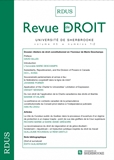 Han-Ru Zhou, « La pertinence en contexte canadien de la jurisprudence constitutionnelle du Conseil privé relative à l’indépendance judiciaire », 45 Revue de droit de l'Université de Sherbrooke 235-271
Han-Ru Zhou, « La pertinence en contexte canadien de la jurisprudence constitutionnelle du Conseil privé relative à l’indépendance judiciaire », 45 Revue de droit de l'Université de Sherbrooke 235-271
Résumé
La présente étude examine le principe constitutionnel dit « non écrit » ou implicite de l’indépendance judiciaire dans une perspective comparée. L’exercice du contrôle judiciaire de constitutionnalité des lois sur la base de tels principes n’est pas unique au contexte canadien. En effet, depuis plus d’un demi-siècle, le Comité judiciaire du Conseil privé examine la conformité de lois à des principes constitutionnels implicites dans des affaires provenant de pays du Commonwealth ayant adopté, comme au Canada, une Constitution basée sur le « modèle de Westminster ». Cette jurisprudence du Conseil privé suggère que la position de la Cour suprême est loin d’être aussi exceptionnelle qu’on aurait pu initialement le croire. La jurisprudence de la Cour suprême s’inscrit plutôt dans un courant plus global au sein du Commonwealth permettant le recours à des principes constitutionnels implicites, en particulier l’indépendance judiciaire et la séparation des pouvoirs, dans l’exercice du contrôle judiciaire des lois. L’analyse comparée proposée aurait fourni à la Cour suprême un appui additionnel considérable à sa position concernant la portée constitutionnelle du principe de l’indépendance judiciaire.
Abstract
This essay examines the “unwritten” or implied constitutional principle of judicial independence from a comparative perspective. The exercise of judicial review on the basis of such principles is not unique to the Canadian context. Indeed, for more than half a century, the Judicial Committee of the Privy Council has been examining the conformity of laws to implied constitutional principles in cases from Commonwealth countries which, as in Canada, have adopted a Constitution based on the “Westminster Model”. This Privy Council case law suggests that the position of the Supreme Court is far from being as exceptional as one would have initially thought. Rather, the Supreme Court case law fits with a more global trend within the Commonwealth allowing the resort to implied constitutional principles, in particular judicial independence and the separation of powers, in conducting judicial review of legislation. It follows that the proposed comparative analysis would have provided the Supreme Court significant support for its position regarding the constitutional extent of the principle of judicial independence.
Lien vers l'annonce de cette nouvelle parution (site de l'Université de Sherbrooke)









